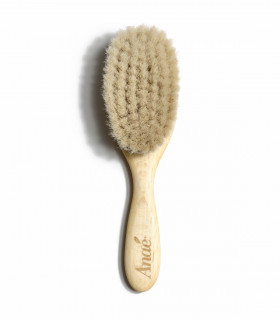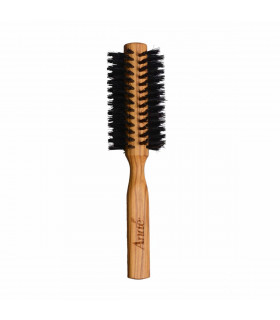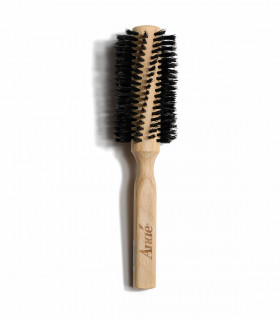Why choose a wooden hair brush ?
When we talk about a wooden hairbrush, we are talking about at least three types of hairbrushes:
- Hairbrush with wooden handle and pins
- Hairbrush with a wooden handle and animal hair silk (boar, goat, horse hair)
- Hairbrush with wooden handle and vegan bristles
A wooden brush is a daily essential for detangling or styling hair. Unlike plastic hairbrushes, it is significantly more robust and can last a very long time, if not a lifetime. Its elegance is incomparable and the use significantly more pleasant than that of a plastic brush. It is respectful of the environment and of each hair because the friction is much less intense. A wooden hairbrush does not fragment our natural keratin and therefore does not weaken our hair. Wood, being a natural and renewable material, the wooden hairbrush is eco-designed and eco-responsible. Natural wood hairbrushes are very often certified, which gives us a guarantee that the wood comes from sustainably managed forests.
The characteristics of a hairbrush made of wood and animal bristles
Wood hair and animal silk hair are very popular and renowned for their quality. The best known are brushes made of wood and boar, goat or horse hair. Depending on the type of bristle chosen, the characteristics of the natural brush change:
1. Wooden boar bristle hairbrush
Boar bristles have been used for centuries in the manufacture of natural brushes and, just like human bristles, are made from keratin. A boar bristle hairbrush allows optimal sebum distribution over the entire length of the hair. This helps to distribute the sebum correctly from the roots to the tips for maximum nourishment. A boar bristle hairbrush therefore gives our hair prolonged freshness because the sebum is not stored only on our scalp. Boar hair, being natural and rich in keratin, it decreases static electricity and absorbs dirt, dead skin and excess fat from our hair fibers. The boar hair is both firm and soft. They perfectly penetrate rebellious hair and add shine during brushing.
2. Wooden goat hair brush
Goat hair is extremely soft and delicate. Natural wooden brushes with goat hair are mostly used for babies and their very fragile hair and skull. This baby brush is not only used to hair-dress your little angle, but also to massage his or her skull, from birth, which stimulates the hair follicles of the scalp. It is thanks to this little massage performed every day that baby's hair will grow faster and be stronger. The goat hair brush will also allow you to perform a very gentle massage on baby's shoulders and neck. It will also be used to allow the small crusts of milk to leave. Your baby will surely enjoy this gentle brushing and massage moment.
The characteristics of a wooden hairbrush with wooden pins
A wooden hairbrush with wooden pins is perfect as a hair conditioner. The pins, being very spaced, they allow the brush to penetrate the hair over its entire length and ensure maximum disentangling. It reduces the effect of static electricity and is ideal for detangling curly or wavy hair without breaking the curls. The wooden pins promote a gentle massage of the hair and the scalp, which stimulates blood circulation. A wooden picot brush works well for long or short, curly or straight hair.
The characteristics of natural vegan fiber hairbrush
Hairbrushes made with vegetal fibers are a great alternative for anyone looking for vegan brushes. Equipped with vegetal sisal bristles, this organic fiber brush combs the hair and styles them just like a boar bristle hairbrush. This vegan brush is perfect for hair hygiene. Just like the wood and boar bristle brush, the vegan brush spreads sebum from the roots of the hair to the ends, providing them with optimal nutrition. However, this brush does not disentangle hair. It will therefore not be suitable for curly or frizzy hair.
How is a wooden brush better than a plastic brush?
If you're considering swapping out your hairbrush, don't hesitate to opt for a wooden hairbrush. Plastic hairbrushes weaken the scalp and break up the natural keratin. Wooden hairbrushes are much more respectful of the environment and our scalp. They are more pleasant in hand, robust and solid. The friction caused by wooden hairbrushes is more delicate than that caused by plastic hairbrushes.
Wooden brushes are also more environmentally friendly. They are very often certified and manufactured locally. The certificates obtained guarantee that the wood used comes from European forests. The FSC “Forest Stewardship Council” label comes in three versions:
- The 100% FSC certificate: this label indicates that the product has been made entirely from materials from FSC certified forests
- The FSC Recycled certificate : proves that the product has been made entirely from recycled materials. This label is applied to paper and wood products.
- The mixed FSC certificate
Which wooden brush for which type of hair?
Hair types are among the most important criteria when choosing your wooden brush.
- Curly or wavy hair: your curly, frizzy or kinky hair will enjoy the operation of the wooden pins brush or wide toothed wooden comb.
- Fine hair: For fine hair, boar bristle hair brushes or vegan fiber brushes will be perfect. The boar bristles and organic hairs will gently rub your hairs, without breaking them further.
- Baby and toddler hair: Baby’s soft and fine hair requires special treatment. The goat hair wooden hairbrush will fit perfectly suited on a baby's scalp.
- Fine, long hair: The natural boar bristle hairbrush will give delicate, long hair all the delicacy and care it needs. It will distribute the sebum throughout the hair to prevent washing too often.
What type of wood for a wooden hairbrush?
There are several types of wood used to make wooden hairbrushes. The best known are the woods of:
- Beech
- Pearwood
- Olive-tree wood
- Bamboo
- Maplewood
- Etc.
The most important thing is to choose a wooden hairbrush labeled FSC or PEFC. These certificates ensure that the wood comes from a secure source and that the forests are managed sustainably.
How to take care of your wooden hairbrush?
It is very important to take care and clean your wooden hairbrush regularly. Whether of plant or animal origin, the wooden brush requires cleaning once a month. As you brush, a hairbrush accumulates sebum, the rest of the hair cosmetics, dust or even dead skin or hair. Almost invisible, these elements are harmful for your hair. The accumulation of dead canes and dandruff favors the clogging of the hair follicles, which disrupts the growth of the hair fiber and slows down the hydration and nutrition of the hair. Before washing the hairbrush, it should be cleaned with a comb or (in the case of a boar bristle brush) with a miniature brush by rubbing the two brushes together. Then wash a brush with a mild natural soap, shampoo or baking soda. You can also soak the hairbrush in a container of lukewarm water mixed with white vinegar for two to three hours. At the end, wipe the wooden hairbrush with a cloth and let it air dry.






